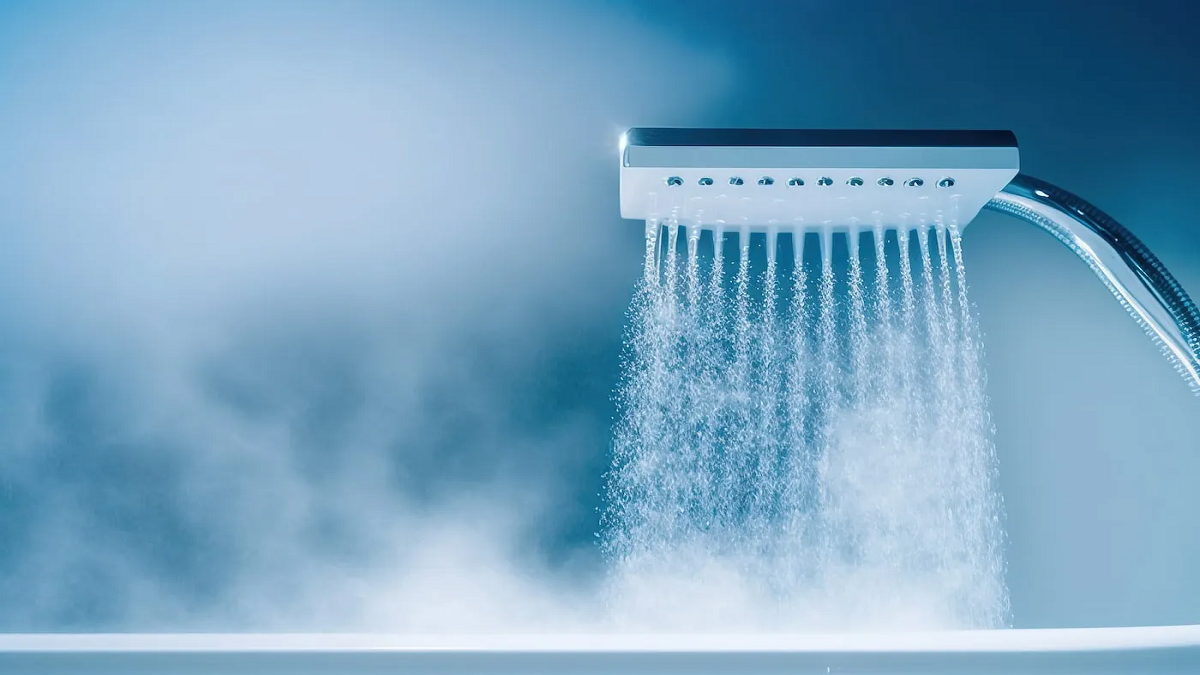The health benefits of hot showers are often discussed, but cold showers are also thought to have many advantages. Have you ever pondered cold shower vs hot shower, and which is superior? Because the heat promotes vasodilation, or the enlargement of blood vessels, which improves blood circulation, hot showers are well recognized for their calming effects.
This procedure may relieve stiffness and relax tense muscles. In addition to relieving cold and allergy symptoms, the steam produced by hot showers may also help clear the respiratory system. On the other hand, cold showers are renowned for their ability to quickly rejuvenate. The first shock of cold water triggers the body’s sympathetic nervous system, which may result in heightened awareness and an energy spike.
Know The Benefits, Then Decide

Benefits Of Cold Shower
1. Boosts Circulation
In the cold shower vs hot shower, one of the most immediate benefits of cold showers is their ability to stimulate circulation. When you expose your body to cold water, your blood vessels constrict, which helps to push blood toward your vital organs. This process, known as vasoconstriction, is followed by vasodilation, or the widening of blood vessels once you warm up.
This cycle improves blood flow, increases oxygen delivery to tissues, and helps remove waste products from the body. The enhanced circulation resulting from cold showers can lead to better overall cardiovascular health. Increased blood flow helps to lower blood pressure, reduce the risk of heart disease, and improve muscle recovery after exercise.
2. Improves Skin and Hair Health
Cold water has long been considered a natural tonic for the skin and hair. Unlike hot water, which can strip the skin and hair of their natural oils, cold water helps to tighten pores and cuticles, promoting a healthier appearance.
For the skin, cold water can reduce the appearance of redness and inflammation. It helps to constrict the blood vessels beneath the skin, which can make the skin look smoother and less puffy. Cold showers also help to maintain the skin’s natural moisture balance, preventing it from becoming overly dry, which can often result from hot showers.
For your hair, cold water can enhance shine and strength. Cold water helps to close the hair cuticles, preventing dirt and pollutants from entering the hair shaft and making the hair look shinier and healthier. Additionally, cold water can help improve scalp health by promoting better circulation, which can aid in reducing dandruff and other scalp conditions.
3. Increases Alertness and Energy Levels
One of the benefits of cold and hot showers is that cold showers can have an immediate energizing effect on the body and mind. When you step into a cold shower, the shock of the cold water activates the body’s “fight or flight” response, releasing endorphins (the body’s natural feel-good hormones) and increasing adrenaline levels.
This boost of energy can leave you feeling more awake, focused, and alert, making cold showers an excellent way to start the day or break up an afternoon slump. Additionally, the shock of cold water stimulates the body’s sympathetic nervous system, which increases heart rate and blood flow, resulting in a heightened sense of awareness and readiness.
4. Reduces Muscle Soreness and Inflammation
Cold water immersion has long been used by athletes to reduce muscle soreness and speed up recovery after intense physical activity. When you take a cold shower, the cold water helps to reduce inflammation and flush out lactic acid from the muscles, which builds up during exercise and contributes to soreness.
The cold water constricts blood vessels and reduces swelling, which can be especially helpful after a tough workout or physically demanding task. Once you step out of the cold shower and warm up, your blood vessels dilate, and blood rushes back to your muscles, helping to promote healing and remove waste products. This process speeds up recovery and reduces muscle stiffness.
5. Enhances Immune Function
In the debate of cold shower vs hot shower, cold showers are thought to boost the immune system by stimulating the production of white blood cells. These cells are essential for fighting off infections and illnesses. Cold water exposure activates the body’s immune response, prompting the release of more white blood cells, which help to combat pathogens and keep the body healthy.
Regular exposure to cold water can help the body become more resilient to environmental stressors, allowing it to better handle changes in temperature and potential infections.
Benefits Of Hot Shower
1. Muscle Relaxation and Pain Relief
One of the most immediate and noticeable benefits of a hot shower is its ability to relieve muscle tension. Hot water works by increasing blood flow and dilating blood vessels, which in turn helps to relax tight muscles and ease stiffness. This is particularly beneficial after physical exertion, whether from exercise, manual labor, or prolonged periods of inactivity.
When we take a hot shower, the warmth penetrates deep into the muscle fibers, promoting relaxation and easing pain caused by overexertion. For those suffering from chronic conditions such as arthritis or fibromyalgia, the heat can provide much-needed relief by reducing inflammation and increasing the circulation of oxygenated blood to sore joints.
Hot showers are also effective in alleviating tension headaches, as the warmth helps to relax the neck and shoulder muscles, areas that are often sources of tension and pain.
2. Improved Circulation
Hot showers stimulate blood circulation, which is beneficial for overall health. The heat causes blood vessels to dilate, allowing for improved blood flow throughout the body. This increased circulation not only helps to deliver oxygen and nutrients more efficiently to tissues but also promotes the removal of waste products, such as carbon dioxide and lactic acid, from muscle tissue.
Increased circulation can help reduce the risk of cardiovascular diseases by lowering blood pressure and improving heart function. In essence, the circulatory benefits of hot showers contribute to improved cardiovascular health and an enhanced ability to detoxify the body.
3. Skin Health and Hydration
Hot water plays a significant role in improving skin health, although it is important to use moderation. When you take a hot shower, the steam opens up your pores, allowing for a deeper cleanse. This is particularly beneficial for those with oily skin or clogged pores, as it helps to flush out dirt, excess oils, and impurities that can contribute to acne and other skin conditions.
In addition to deep cleansing, hot showers can improve skin hydration. The steam helps to open up the skin’s moisture barrier, allowing for better absorption of moisture and skin-care products, such as lotions or oils. For individuals with dry or flaky skin, a hot shower can help to rehydrate and soften the skin, providing relief from irritation and tightness.
However, it’s worth noting that excessively hot water can strip the skin of its natural oils, leading to dryness if used for prolonged periods. Therefore, it’s important to find a comfortable temperature that promotes skin health without causing harm. A moderately hot shower, followed by the application of a hydrating moisturizer, can leave your skin feeling soft, smooth, and rejuvenated.
4. Stress Reduction and Mental Clarity
Hot showers are widely recognized for their ability to promote mental relaxation and reduce stress. The warmth of the water has a calming effect on the body and mind, helping to lower levels of the stress hormone cortisol. The sensation of being enveloped in warm water triggers a relaxation response, which calms the nervous system and encourages the production of endorphins, the brain’s natural “feel-good” chemicals.
The psychological benefits of hot showers are particularly evident in individuals who experience high levels of stress or anxiety. A hot shower can act as a form of meditation, providing a brief respite from the pressures of daily life. The warmth can induce a state of mindfulness, where you can disconnect from external stressors and focus on the present moment, allowing for mental clarity and emotional relaxation.
Additionally, hot showers can aid in improving sleep quality. The relaxation induced by the warm water lowers heart rate and promotes feelings of tranquility, helping individuals to unwind before bedtime. As the body cools down after the shower, it signals to the brain that it’s time to sleep, which can lead to deeper, more restful sleep.
5. Respiratory Benefits and Sinus Relief
Another lesser-known benefit of the benefits of cold and hot showers is that hot showers have the ability to improve respiratory health. The steam produced by hot water can help clear nasal passages, soothe irritated airways, and alleviate symptoms of congestion. For individuals suffering from colds, allergies, or sinus infections, the moist heat can work wonders in reducing congestion, thinning mucus, and promoting easier breathing.
The steam from a hot shower can also help reduce inflammation in the respiratory system, providing relief from coughing and throat irritation. The combination of warmth and steam can open up the airways, making it easier for the body to expel mucus and other irritants.
For those with chronic respiratory conditions such as asthma or bronchitis, a hot shower can provide temporary relief by easing breathing difficulties and promoting lung function. However, individuals with such conditions should exercise caution, as hot and humid environments may exacerbate symptoms for some.
Who Are These For?
For those who are confused between a cold shower vs hot shower and have persistent muscular soreness or who want to unwind before bed, hot baths are perfect. On the other hand, athletes or others who have muscular pain after strenuous physical activity might benefit more from cold showers.
Hot water showers have the potential to dry out the skin and make dermatitis, psoriasis, and eczema worse. People with certain skin issues should take a lukewarm shower and use a moisturizer immediately after to seal in the moisture.
On the other hand, those with diabetes, high blood pressure, and poor circulation benefit from cold water showers. For those with rosacea or acne, washing the face with cold water is advised since it soothes and calms the skin and prevents flare-ups from happening.
Before choosing Cold Shower vs Hot Shower a certain shower temperature, it is crucial for some people to see a doctor. Before having a cold shower, those with cardiovascular issues should speak with their cardiologists since sudden temperature changes might put additional strain on the heart. Similarly, hot showers may exacerbate dryness and irritation for those with skin disorders like eczema.
FAQ
Q: Can I take a cold shower in cold weather?
A: You can, but consider your comfort and medical conditions (if any) before that. However, some people in Russia take dips in ice cold water for various underlying benefits. Doing the opposite, i.e., taking a hot shower in hot weather, isn’t advisable.
Q: Is a hot or cold shower preferable?
A: For athletes or others who experience muscular discomfort after vigorous physical activity, cold showers are more appropriate. Hot water showers can dry up the skin and exacerbate dermatitis, psoriasis, and eczema.
Q: Is a hot shower better for hair than a cold one?
A: Choosing the proper balance is essential for the best outcomes since hot and cold water temperatures have different effects on hair health while washing. While cold water helps smooth cuticles, preserve moisture, and promote circulation, hot water may provide deeper washing and raise follicles.











